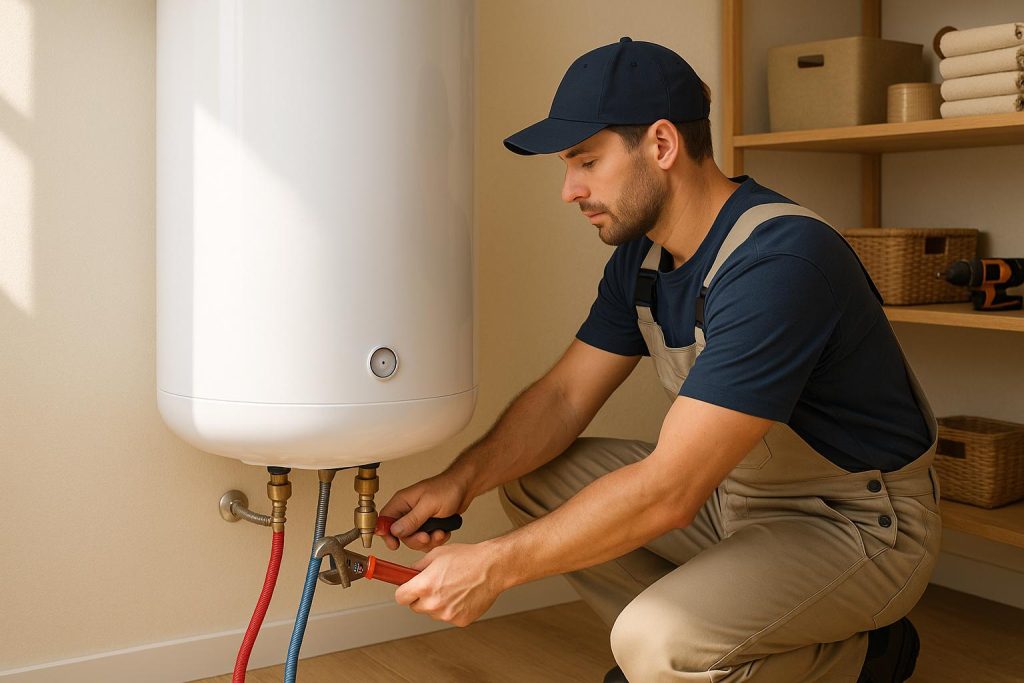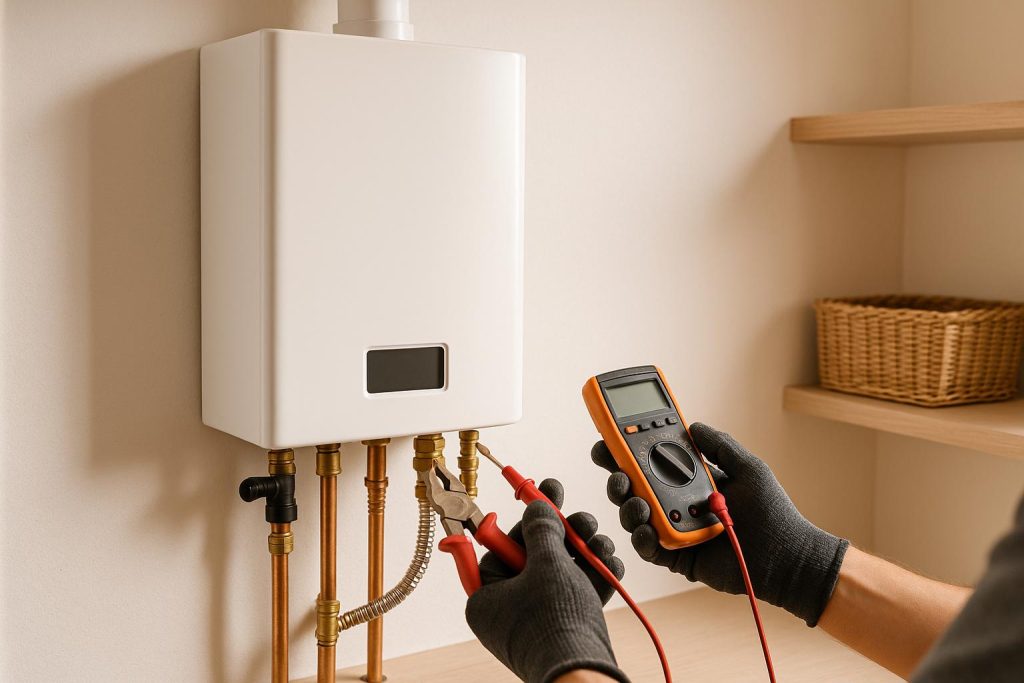
Central air conditioning systems rely on refrigerants like Freon (typically hydrochlorofluorocarbon R-22 or hydrofluorocarbon R-410A) to facilitate the cooling process. It’s essential to maintain the proper refrigerant charge for the system to function optimally.
Here’s a summary of when to consider recharging your central AC if it’s low on Freon:
Signs of Low Refrigerant
- Reduced Cooling Capacity: One of the most noticeable signs of low refrigerant is decreased cooling efficiency. If your AC system struggles to cool your space as effectively as it used to, it might be low on refrigerant.
- Warm Airflow: If the air coming from your vents feels warmer than usual, even when the thermostat is set to a lower temperature, it could indicate insufficient refrigerant.
- Ice Buildup: Ironically, low refrigerant can lead to ice buildup on the evaporator coil or refrigerant lines. Ice restricts airflow and further impairs cooling.
- Hissing or Bubbling Sounds: If you hear hissing or bubbling sounds near the refrigerant lines, it might indicate a refrigerant leak. This leak could lead to low Freon levels.
When to Recharge
- Professional Assessment: If you suspect your central AC is low on refrigerant or if you’ve noticed any of the above signs, it’s essential to contact a qualified HVAC technician. They can perform a thorough inspection to confirm if refrigerant levels are low and identify any leaks.
- Recharge or Repair: If your technician determines that your AC is low on refrigerant due to a leak, they will need to repair the leak before recharging the system. Simply adding more refrigerant without addressing the leak is not a long-term solution and is environmentally harmful.
- Recharging: Once the leak is repaired, the technician will recharge your AC system with the appropriate amount of refrigerant to bring it back to the recommended level.
Preventive Maintenance
To avoid low refrigerant levels and associated issues, consider regular preventive maintenance for your central AC system. This includes cleaning coils, checking for leaks, and ensuring the proper refrigerant charge. Addressing any problems promptly can extend the lifespan of your AC unit and improve its overall efficiency.
Why Your Air Conditioner is Low on Freon

An air conditioning system is made up of 3 components. These are the compressor, condenser coil and evaporator coil.
The 3 components are connected together using copper pipes. Freon/refrigerant is then cycled between these components where it easily changes state from gas to liquid and back to gas again and in the process remove heat from indoors thanks to its high latent heat of vaporization.
Unlike the gas used in your car, an air conditioner’s refrigerant should never get depleted. It only changes from one state to another but it is never used up. Air conditioners use electrical energy to run but not Freon.
Therefore, as I had earlier mentioned, if you think that your central air conditioner (or any other air conditioner for that matter) is low on Freon, you need to call in an HVAC technician as it is a sign that the refrigerant is leaking out.
The thing about air conditioning is that it is really hard to diagnose a problem unless you are a trained technician. You could be thinking that your AC is low in Freon while in essence you could be dealing with a bad compressor or fan.
How Do I know if My Central Air is Low on Freon?
Just to remind you, Freon in this case refers to the actual Freon (R-22) or any other refrigerant used in air conditioning. Many folks haven’t yet get used to Puron or the various other newer refrigerant brands.
In more details now, the following are the telltale signs that your central air conditioner is low on Freon:
1. AC is Running but not Cooling the House
As I mentioned earlier, the work of the refrigerant is to cool the house by absorbing heat from the indoor air. When Freon enters the evaporator coil inside the house, it is usually in the form of a cold liquid.
The cold refrigerant liquid absorbs heat from the warm indoor air until it (Freon) evaporates and enters the compressor as a gas. As it evaporates, its takes with it heat from house.
Now, if there is no sufficient refrigerant in the air conditioning lines, heat from the indoor air will not be absorbed. As a result, you will notice that the AC is running but the air inside the house is still warm.
2. High Electricity Bill
Your house is equipped with a thermostat whose function is to send a signal to the various AC components to start running as a soon as the indoor temperature drops below its (thermostat) settings.
If the air conditioner is unable to cool the air inside the house as per the thermostat settings, the thermostat will signal the AC to keep running in a bid to try and cool the house.
Needless to say, the longer your AC runs the more the power it consumes and the higher your utilities bill.
3. Ice Buildup on Refrigerant Line
Where you central air conditioning system is low on Freon/refrigerant, the evaporator coil inside the house gets too cold, resulting in a backflow of the Freon (now a cold liquid) in the refrigerant line.
Due to the difference in temperature between the refrigerant inside the line and the surrounding air, condensation takes place and ice starts to build up on the refrigerant line.
It is the same thing that happens when you are inside your car (warm) while it is freezing outside. Your car windows will after sometime become foggy and you will need to turn on heat to defrost them.
I should mention that ice buildup on an AC’s refrigerant lines is a serious problem. If not fixed in good time, the liquid can flow back all the way back to the compressor.
A compressor should only compress the refrigerant in its gas state. A liquid inside the compressor will without a doubt damage it resulting in even more expensive repairs.
4. Hissing or Bubbling Sound
It is not easy to notice a leak of your air conditioner’s refrigerant but if it is a major leak you sure can. A hissing or bubbling sound from the refrigerant line or even coil is a good sign that Freon is leaking from your AC system.
Can you detect if your AC’s Freon is leaking by the sense of smell?
At low concentration, a Freon leak will have no distinctive taste or smell. However, if there is a lot of the Freon leaking (high concentration), the Freon will have a slightly sweet smell. The smell can also be similar to that of nail polish, paint or paint thinner.
5. Heat Pump not Heating the House
A heat pump is basically an HVAC system that works pretty much like a central air conditioner during the months of summer but also heats the house during winter. From the outside, heat pumps and central air ACs look exactly the same.
A heat pump has a reversing valve that allows high-pressure superheated refrigerant gas to flow to the evaporator instead of the condenser coil. Inside the house, the cold indoor air absorbs heat from the refrigerant and that is how the house is heated.
If the heat pump system is low on Freon, it will be unable to extract heat from the surrounding air meaning that the heat pump will not have energy to heat the house.
Because heat pumps are always equipped with a secondary source of heat, you will therefore notice that the auxiliary heating will always be on in your thermostat even when it shouldn’t be.
How Do You Know Which Refrigerant You AC Uses?
To check the type of refrigerant used by your air conditioner, look for a nameplate or label on the air conditioner’s outside unit, also known as a condenser unit.
On the nameplate you will find more details about the air conditioner but importantly you will see the type of refrigerant it uses. You can also find that information on the unit’s user manual if you still have it.
Conclusion
And basically those are the major signs that your central AC system is low on Freon and that it needs to be recharged.
Unfortunately, this is not something you can do on your own. A licensed HVAC technician will first need to find and fix the leak before recharging the system.





